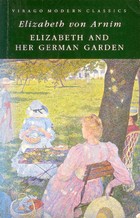Review: ‘Elizabeth and her German Garden’ by Elizabeth von Arnim
 I very rarely plan what I’m going to read ahead of time, preferring to pick books from my shelves as the mood takes me, so it’s even more surprising when literary serendipity strikes. I really enjoy suddenly discovering that the book I’m reading is set in a place that I’ve just visited, references a book that I’ve read recently or has some other connection which makes it seem particularly relevant to me. In the case of Elizabeth and her German Garden, by complete coincidence I started reading it on the same date as the first entry in the book, May 7th. This should give you some idea of how long it has taken me to get round to this review, but my first foray into Elizabeth von Arnim’s writing was such a lovely experience that I can still remember the book remarkably clearly.
I very rarely plan what I’m going to read ahead of time, preferring to pick books from my shelves as the mood takes me, so it’s even more surprising when literary serendipity strikes. I really enjoy suddenly discovering that the book I’m reading is set in a place that I’ve just visited, references a book that I’ve read recently or has some other connection which makes it seem particularly relevant to me. In the case of Elizabeth and her German Garden, by complete coincidence I started reading it on the same date as the first entry in the book, May 7th. This should give you some idea of how long it has taken me to get round to this review, but my first foray into Elizabeth von Arnim’s writing was such a lovely experience that I can still remember the book remarkably clearly.
Elizabeth and Her German Garden is a semi-autobiographical account of a year in the life of Elizabeth von Arnim in the garden of her house in Pomerania. It is a book which is in equal parts an elegiac description of her physical surroundings and a keenly observed, wryly detached depiction of the people who inhabit that world with her, most of whom are apparently rather unwelcome.
At only 207 pages in the edition I read, and that with large type and larger margins, it is a short book but full of excellent content. Whether she is discussing plants or people, von Arnim’s writing is a delight to read, and my copy of the book is littered with tiny bits of paper marking pages with particularly lovely passages. Her musings on governesses are typical of her style which is both insightful and often amusing:
I wonder why governesses are so unpleasant. The Man of Wrath says it is because they are not married. Without venturing to differ entirely from the opinion of experience, I would add that the strain of continually having to set an example must surely be very great. It is much easier, and often more pleasant, to be a warning than an example, and governesses are but women, and women are sometimes foolish, and when you want to be foolish it must be annoying to have to be wise.
 One of the things that struck me about this book was the faint air of sadness about it. I think it came across particularly because of reading Perfume from Provence quite recently, which also has a section on the trials and tribulations of creating a beautiful European garden. Whereas Winifred Fortescue’s happiness and enthusiasm burst from the page, Elizabeth appears to have a rather unhappy life and to be trying hard to create her own happiness along with her garden, although her attempts are often frustrated. I initially thought that The Man of Wrath must be a teasing, affectionate name for her husband, but the more she spoke about him, the more apt the name seemed, while Winifred Fortescue and Monsieur are obviously perfectly matched and gloriously content together. Had Perfume from Provence not been so fresh in my mind, this impression might not have come across so strongly, but as it is the tone felt slightly wistful.
One of the things that struck me about this book was the faint air of sadness about it. I think it came across particularly because of reading Perfume from Provence quite recently, which also has a section on the trials and tribulations of creating a beautiful European garden. Whereas Winifred Fortescue’s happiness and enthusiasm burst from the page, Elizabeth appears to have a rather unhappy life and to be trying hard to create her own happiness along with her garden, although her attempts are often frustrated. I initially thought that The Man of Wrath must be a teasing, affectionate name for her husband, but the more she spoke about him, the more apt the name seemed, while Winifred Fortescue and Monsieur are obviously perfectly matched and gloriously content together. Had Perfume from Provence not been so fresh in my mind, this impression might not have come across so strongly, but as it is the tone felt slightly wistful.
I long more and more for a kindred spirit–it seems so greedy to have so much loveliness to oneself–but kindred spirits are so very, very rare; I might as well cry for the moon. It is true that my garden is full of friends, only they are dumb.
In spite of this, Elizabeth and Her German Garden is not a sad or depressing book. Von Arnim has a great sense of comedy and the book is filled with wit and charm. Thankfully von Arnim seems to have been rather prolific, so I have plenty more of this to look forward to in her other novels.
Elizabeth and Her German Garden by Elizabeth von Arnim. Published by Virago, 1995, pp. 207. Originally published in 1898.
6 Responses to “Review: ‘Elizabeth and her German Garden’ by Elizabeth von Arnim”
Comment from oldenglishrose
Time September 22, 2011 at 3:47 pm
It was a lovely book. I’ve got a couple of her other books on the shelves but she doesn’t strike me as a very autumnal author, so I think I’ll save them for next year.
Pingback from Elizabeth and her German Garden by Elizabeth von Arnim « The Sleepless Reader
Time January 19, 2012 at 2:42 pm
[...] thoughts: So Many Books, Musings, Small World Reads, Iris on Books, Old English Rose Reads, SassyMonkey Reads, A Garden Carried in the Pocket, Lunnie’s Musings (yours?) Advertisement [...]
Comment from Carol M. Chappell
Time January 22, 2012 at 1:50 am
One of my friends called me years ago and said, “Carol, you must read this book that I just found.” That started an adventure with Mary and two other of our friends to find more “Elizabeth” books. It took us several years, but Mary and I finally found all of von Arnim’s books and have read them all, some twice. She is one of my all time favorite authors. I am glad that people are still discovering and loving Elizabeth’s writing, but I think her works should be listed with the literary classics. Sadly, she seemed to be forgotten after WWII. Styles change, I suppose, but I find her writings as relevant today as in her time.
Comment from coqauvin
Time January 22, 2012 at 10:13 pm
I just wish I knew when E.Von A. is writing with tongue in cheek.Does she really agree that wife-beating is good and that the help are no better than animals? I like to believe she writes what she observes leaving the reader to make his or her own opinion. Does anyone know which way her sympathies ran? When the movie is made, Gwyneth Paltrow should play E.Von A.
Comment from coqauvin
Time January 22, 2012 at 10:36 pm
OK, now I get it. I did a quick search online and read about her life. Didn’t want anyone to read this and think I was completely ignorant!Now, everything seems clearer and I can chuckle when appropriate. How sad her married life must have been. Sounds like she was fortunate to be able to live independently for parts of her life. Now, who should play “The Man of Wrath”?
Comment from Verity
Time September 21, 2011 at 11:21 am
Oh one of my very very favourites, such a beautiful book, and how wonderful that you are at the start of your von arnim journey.